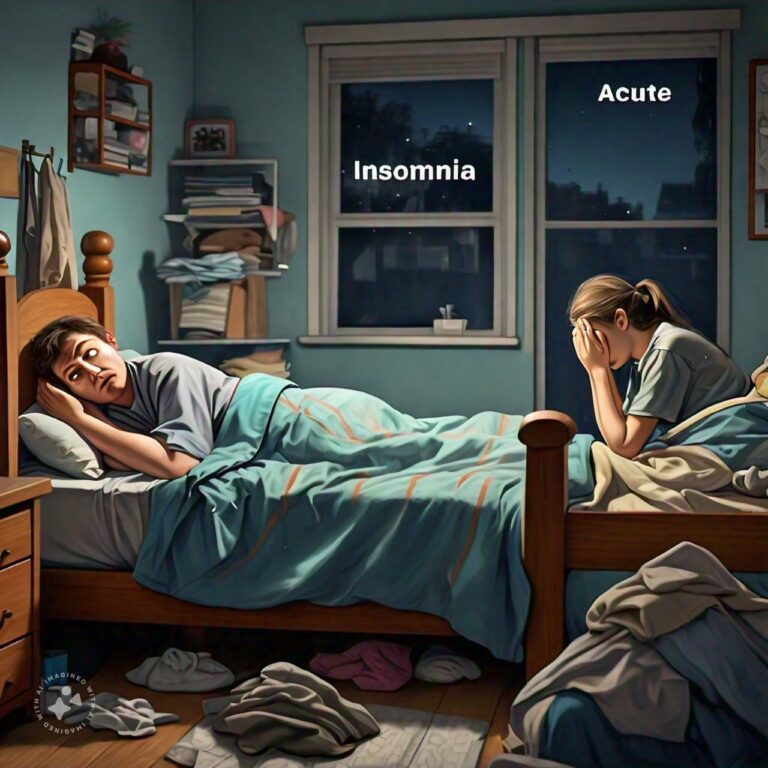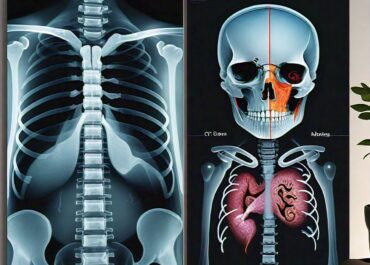
Differences Between Acute and Chronic Insomnia
Insomnia is a common sleep disorder characterized by difficulty falling asleep, staying asleep, or waking up too early, leading to poor sleep quality. It can significantly affect daily functioning, mood, and overall health. There are two main types of insomnia: acute insomnia and chronic insomnia. Acute insomnia is short-term and typically triggered by a specific event or stressor. It often lasts for a few days to a few weeks and is commonly associated with temporary life changes, such as stress from work, family issues, or major life transitions. While acute insomnia can be distressing, it usually resolves on its own once the stressor is removed or adapted to.
In contrast, chronic insomnia is a long-term condition where sleep difficulties occur at least three nights a week for three months or longer. Chronic insomnia often stems from underlying health problems, lifestyle factors, or long-term stress and anxiety. Unlike acute insomnia, chronic insomnia doesn’t simply go away with time and may require targeted treatment, such as cognitive-behavioral therapy for insomnia (CBT-I), medication, or lifestyle changes. Chronic insomnia can significantly impair physical and mental health, leading to fatigue, cognitive impairment, and increased risk of health conditions like depression, heart disease, and diabetes.
Acute Overview
Acute insomnia is a short-term sleep disturbance often triggered by immediate external factors. Below are five key aspects of acute insomnia.
1. What is Acute Insomnia?
Acute insomnia is a temporary form of insomnia that typically lasts for a few days to a few weeks. It is often caused by a specific event or stressor, such as a job interview, an upcoming exam, or a family crisis. Acute insomnia is also known as adjustment insomnia because it frequently occurs when an individual is adjusting to new circumstances, such as changes in environment, schedule, or emotional stress. The sleep issues related to acute insomnia may resolve on their own once the triggering event has passed or the person adapts to the new situation.
- Short-Term Sleep Disturbance: Usually lasts a few days to a few weeks.
- Triggered by Stress: Often caused by specific life events or temporary stressors.
2. Causes of Acute Insomnia
The causes of acute insomnia are usually related to sudden changes or stressors in a person’s life. Common triggers include:
- Stress and anxiety: Major life events like losing a job, divorce, or moving to a new city can cause temporary insomnia.
- Travel: Jet lag or adjusting to a different time zone can disrupt normal sleep patterns.
- Illness or pain: A temporary health issue, such as the flu or an injury, can make it difficult to sleep.
- Environmental factors: Noise, light, or changes in temperature can contribute to short-term sleep disturbances.
- Stress and Anxiety: Life events like job loss or family conflict can trigger acute insomnia.
- Jet Lag and Travel: Disruption in the sleep cycle due to travel or time zone changes.
3. Symptoms of Acute Insomnia
The primary symptoms of acute insomnia include:
- Difficulty falling asleep: Individuals may lie awake at night, unable to quiet their minds or relax enough to sleep.
- Frequent awakenings: People with acute insomnia often wake up multiple times during the night, making it hard to get restorative sleep.
- Daytime fatigue: The lack of proper sleep results in tiredness, difficulty concentrating, and irritability during the day.
- Mood changes: Anxiety, frustration, and irritability are common due to poor sleep quality.
- Difficulty Falling Asleep: Struggling to fall asleep even when tired.
- Daytime Fatigue: Feeling tired and sluggish during the day due to poor sleep quality.
4. Diagnosis of Acute Insomnia
Acute insomnia is generally diagnosed based on the individual's sleep history and a review of any recent stressors or life changes. Healthcare providers may ask about sleep habits, daily routines, and any specific events that could be contributing to the sleep disturbance. In some cases, a sleep diary or questionnaire may be used to track sleep patterns. Since acute insomnia is often short-lived, it typically does not require extensive diagnostic testing unless symptoms persist.
- Sleep History Review: Diagnosis is based on recent stressors and sleep patterns.
- Sleep Diary: May be recommended to track sleep habits and disruptions.
5. Treatment for Acute Insomnia
Treatment for acute insomnia typically focuses on addressing the underlying cause of the sleep disturbance and improving sleep hygiene. Some common treatment approaches include:
- Stress management: Relaxation techniques like deep breathing, meditation, or yoga can help reduce stress and make it easier to fall asleep.
- Sleep hygiene: Establishing a consistent bedtime routine, reducing screen time before bed, and creating a relaxing sleep environment can improve sleep quality.
- Short-term use of sleep aids: In some cases, over-the-counter or prescription sleep aids may be used to manage acute insomnia for a brief period.
- Relaxation Techniques: Stress reduction strategies such as meditation or deep breathing.
- Sleep Hygiene: Creating a consistent sleep routine and a comfortable sleep environment.
Chronic Insomnia Overview
Chronic insomnia is a long-term sleep disorder that affects a person’s ability to fall or stay asleep consistently. Below are five key aspects of chronic insomnia.
1. What is Chronic Insomnia?
Chronic insomnia is defined as difficulty falling or staying asleep for at least three nights a week over a period of three months or longer. Unlike acute insomnia, chronic insomnia is not usually triggered by a specific event or short-term stressor. It is often linked to deeper issues, such as chronic stress, mental health disorders (like anxiety or depression), or medical conditions. Chronic insomnia can persist even after the initial cause is resolved, and it requires more structured intervention to manage.
- Long-Term Sleep Disorder: Lasts at least three months and affects sleep three or more nights per week.
- Often Linked to Underlying Conditions: May be associated with mental health or medical issues.
2. Causes of Chronic Insomnia
The causes of chronic insomnia are more complex and can include a combination of psychological, physiological, and environmental factors. Common causes include:
- Chronic stress: Long-term stress from work, relationships, or financial issues can lead to ongoing sleep problems.
- Mental health conditions: Anxiety disorders, depression, and post-traumatic stress disorder (PTSD) are common contributors to chronic insomnia.
- Medical conditions: Chronic pain, asthma, diabetes, or other health issues can interfere with sleep on a long-term basis.
- Medications: Certain medications, including antidepressants, beta-blockers, and steroids, can disrupt sleep patterns.
- Chronic Stress: Long-term stress from work or personal life.
- Mental Health Issues: Conditions like anxiety and depression are closely linked to chronic insomnia.
3. Symptoms of Chronic Insomnia
Symptoms of chronic insomnia are more severe and persistent than those of acute insomnia. They include:
- Persistent difficulty falling asleep: Despite feeling tired, individuals with chronic insomnia struggle to initiate sleep night after night.
- Frequent awakenings: Waking up multiple times during the night or waking up too early without being able to go back to sleep.
- Impaired daytime functioning: Chronic insomnia can lead to excessive daytime sleepiness, reduced concentration, memory problems, and difficulty performing daily tasks.
- Mood disturbances: Chronic sleep deprivation can worsen or lead to irritability, anxiety, and depression.
- Difficulty Initiating Sleep: Persistent struggles to fall asleep despite exhaustion.
- Daytime Impairment: Memory issues, concentration problems, and poor job performance due to lack of sleep.
4. Diagnosis of Chronic Insomnia
Chronic insomnia is diagnosed through a comprehensive evaluation of a person’s sleep history, lifestyle, and underlying medical or psychological conditions. A healthcare provider may ask for detailed information about sleep patterns, daily habits, and emotional well-being. Diagnostic tools include:
- Sleep studies (polysomnography): In some cases, a sleep study may be recommended to monitor brain activity, breathing patterns, and movements during sleep.
- Sleep diary: A record of sleep and wake times can help identify patterns and contributing factors.
- Questionnaires: Tools like the Insomnia Severity Index (ISI) may be used to assess the severity of insomnia.
- Sleep Study: A comprehensive evaluation of sleep patterns and disturbances.
- Sleep Diary and Questionnaires: Used to track sleep habits and assess the severity of insomnia.
5. Treatment for Chronic Insomnia
Managing chronic insomnia often requires a multi-faceted approach that targets both the root cause of the sleep issues and the behavioral habits that contribute to them. Common treatments include:
- Cognitive-behavioral therapy for insomnia (CBT-I): CBT-I is considered the gold standard treatment for chronic insomnia. It addresses the negative thought patterns and behaviors that interfere with sleep.
- Medications: In some cases, prescription medications such as sedative-hypnotics or melatonin receptor agonists may be used, though these are usually a short-term solution.
- Lifestyle changes: Regular exercise, limiting caffeine and alcohol, and maintaining a consistent sleep schedule can improve sleep quality.
- Mindfulness and relaxation techniques: Meditation, progressive muscle relaxation, and other stress-reducing practices can promote better sleep.
- CBT-I: Cognitive-behavioral therapy is highly effective in treating chronic insomnia.
- Medications: Sometimes prescribed as a short-term aid to manage severe insomnia.
Differences Between Acute and Chronic Insomnia
- Duration
- Acute Insomnia: Lasts from a few days to a few weeks.
- Chronic Insomnia: Lasts for three months or longer.
- Cause
- Acute Insomnia: Triggered by temporary stress or changes in environment.
- Chronic Insomnia: Often associated with long-term health issues or psychological conditions.
- Severity
- Acute Insomnia: Generally milder and short-lived.
- Chronic Insomnia: More severe, persistent, and affects overall health.
- Sleep Impact
- Acute Insomnia: Occasional difficulty falling or staying asleep.
- Chronic Insomnia: Consistent sleep disruptions several nights a week.
- Daytime Functioning
- Acute Insomnia: May cause temporary fatigue and irritability.
- Chronic Insomnia: Causes long-term cognitive and emotional impairment.
- Risk Factors
- Acute Insomnia: Stress, travel, life transitions.
- Chronic Insomnia: Mental health disorders, chronic illness, lifestyle factors.
- Treatment
- Acute Insomnia: Focuses on stress management and sleep hygiene.
- Chronic Insomnia: Often requires CBT-I, lifestyle changes, and possibly medication.
- Prognosis
- Acute Insomnia: Usually resolves once the stressor is removed.
- Chronic Insomnia: Requires long-term management and care.
- Medical Intervention
- Acute Insomnia: Often resolves without formal treatment.
- Chronic Insomnia: Requires medical or psychological intervention.
- Sleep Study Necessity
- Acute Insomnia: Typically does not require sleep studies.
- Chronic Insomnia: May involve sleep studies to identify underlying conditions.
Conclusion
Acute and chronic insomnia represent two different forms of the same sleep disorder, distinguished by their duration, causes, and effects on health. Acute insomnia is short-term, often triggered by immediate stressors or environmental changes, and typically resolves on its own. Chronic insomnia, however, is a long-term condition that requires more comprehensive treatment, often due to underlying health or psychological issues. Both types of insomnia can affect daytime functioning and overall well-being, but chronic insomnia has more severe and lasting impacts on mental and physical health. Managing insomnia effectively requires identifying the root cause, implementing behavioral and lifestyle changes, and, in more severe cases, seeking medical or therapeutic intervention. Understanding the differences between acute and chronic insomnia is key to addressing and improving sleep quality, leading to better overall health and wellness.
FAQs
Related Topics
- All
- Animals
- Diseases
- Health
- Money
- Politics
© 2024 OnYelp.com. All rights reserved. Terms and Conditions | Contact Us | About us





